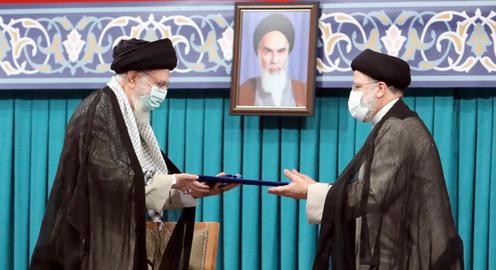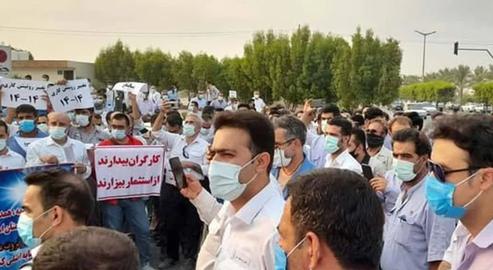At an endorsement ceremony in Tehran on Tuesday morning, Ebrahim Raisi became the 13th president of the Islamic Republic of Iran. The one-time chief justice, lifelong regime loyalist and hanging judge began his inaugural address by regretting he could not kiss the Supreme Leader’s hand due to coronavirus restrictions.
Raisi won the June 18 presidential election with a majority of 62 percent. This amounted to around 18 million votes, from a 60-million strong electorate. Turnout in 2021 was at a historic low of 48.8 percent, while another 12.9 percent of the votes cast were blank or invalid. Millions of Iranians opted to stay at home or spoil their ballots in disgust over a process widely decried as rigged.
None of this appeared to trouble the newly-anointed chief executive of the Islamic Republic on Tuesday. Rather, Raisi said, his electoral win signalled a desire on the part of the people for “a change in the status quo”.
Raisi then promised to rid Iran of “tyrannical” US sanctions, and to implement an economic program to deal with Iran’s skyrocketing inflation and the ravages of Covid-19. This, he said, would be based on the “Second Phase of the Revolution” Supreme Leader Ali Khamenei prescribed for the nation back in 2019.
The “Second Step” manifesto strongly emphasized Khamenei’s fantasy of a “resistance economy” – the idea that Iran could be self-sustaining, in defiance of sanctions, by creating domestic versions of foreign services and industries – and an end to reliance on oil as a source of income. It also calls on Iranians to fight corruption wherever they see it, especially in government.
That aside, though, Khamenei’s statement included no specific provisions on the economy. Much of the text was given over to ideology and spiritual matters, to the “Islamization” of politics and envisaging the Islamic Revolution as part of a bipolar war with the US and “the West”.
Raisi’s deferral to this particular document told those present more about his own brand of hardline politics than about how he plans to tackle Iran’s economic crisis. But it was, of course, welcomed by Khamenei himself, who said on Tuesday: "In the important issue of the country's economy, which is a fundamental issue today, we must proceed with the plan.”
Then in an aside that might have been addressed to either himself or Raisi, Khamenei added: “Every action you take should be part of a plan you have already set up and prepared.”
The inauguration was the outcome of a “planned” election widely dismissed as an “appointment”. On Tuesday, Raisi was then encouraged by Khamenei to form a government as quickly as possible and get on with the ill-defined task ahead. He will be sworn in in the Iranian parliament on Thursday.
Iran's New President Cut Off from Contemporaries by Human Rights Record
Few Iranian officials are a better embodiment of the “resistance economy” than Ebrahim Raisi. Despite being the head of the Islamic Republic’s executive branch – generally a role with at least some outward-facing aspects – his is likely to be the most insular presidency of the last 42 years.
Human rights organizations and UN officials have repeatedly demanded an investigation into Raisi’s record of involvement in crimes against humanity. From the outset of the 1979 Islamic Revolution, as a junior prosecutor Raisi was placed in charge of extrajudicial killings of local Iranian dissidents. In 1988 he had a direct hand in the massacre of thousands of political prisoners as a member of the notorious Tehran “death panel”.
Since then, as head of the judiciary, Raisi has presided over hostage-taking, arbitrary detention, torture and execution of countless more Iranians and foreign citizens, often in defiance of both domestic Iranian law and global conventions to which Iran is a signatory.
International law could – tentatively – allow for Raisi to be prosecuted in a third country, even as a sitting head of state. In order to be entirely secure, he will have to exclusively attend functions in friendly authoritarian states such as Russia, Al-Assad’s Syria or China. In an early test of spine for both Raisi and the international community, he has been invited to attend the UN Climate Conference in Scotland this November.
Despite the new President of Iran’s bloodstained record, parliament spokesman Seyyed Nezamodin Mousavi said that some 115 officials from 73 countries are due to attend the swearing-in ceremony on Tuesday. Most have yet to be named, but the list includes senior European Union official and Iran talks negotiator Enrique Mora.
The decision to send an diplomat from the EU – where 89 Iranian individuals and four entities are sanctioned for human rights violations – to Raisi’s inauguration was criticized by the United Kingdom, France and Germany as well as Israel.
It also comes days after a British national was killed in an attack by Iran on an Israeli-operated cargo ship – and a mere five days before Hamid Nouri, a former Iranian prison official, is due to stand trial in Sweden for war crimes and murder for his alleged part in the 1988 massacre – with the green light from Raisi.
Related coverage:
All But One of Iran's Top Leaders are Under Sanctions
Ebrahim Raisi's Prospects as Iran's First Sanctioned President-Elect
Ebrahim Raisi's Victory Signals Darker Days Ahead for Iran
Election 2021: Raisi Wins; "Invalid" Votes Come Second
Ebrahim Raisi: The Case for the Prosecution
Ebrahim Raisi: Leadership Hopeful's Key Role in Brutalizing Dissidents in the 2000s
Ebrahim Raisi: The 1990s Exploits of "Ayatollah Massacre"
Ebrahim Raisi: The Bloodstained Early Years
Ebrahim Raisi’s Presidential Candidacy: A Gamble on Succeeding Khamenei
visit the accountability section
In this section of Iran Wire, you can contact the officials and launch your campaign for various problems

























comments